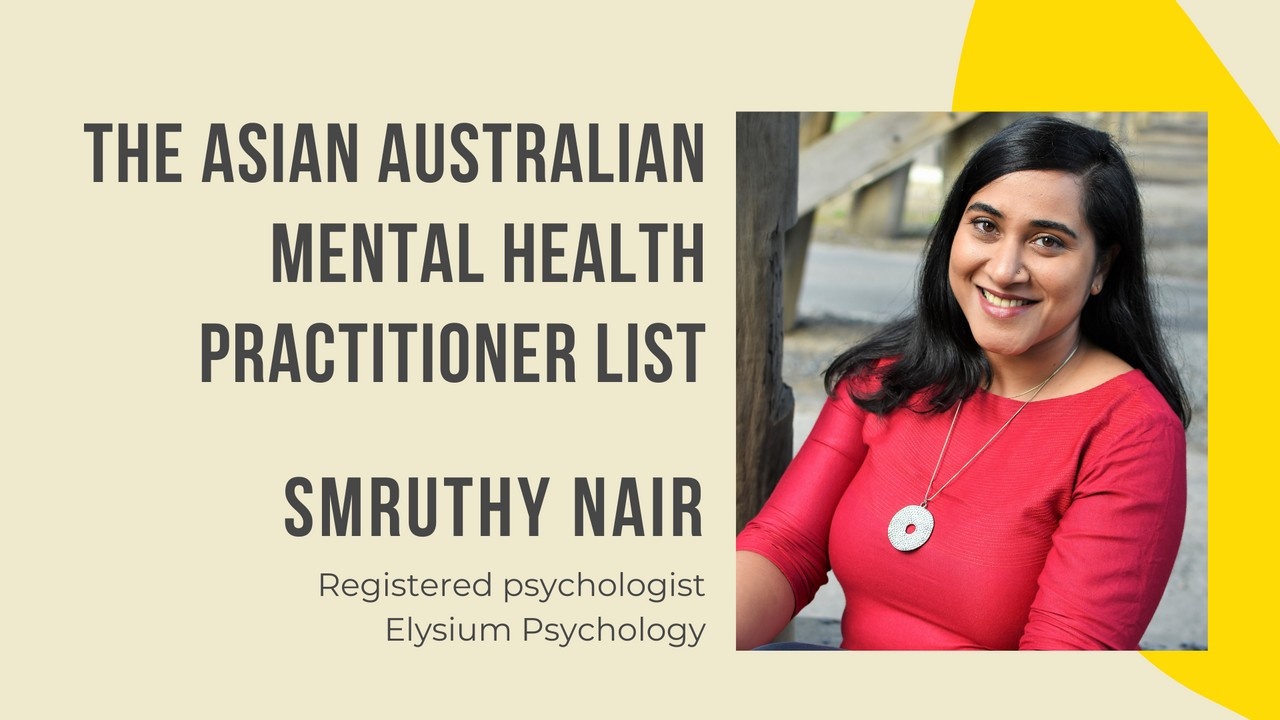MEET REGISTERED PSYCHOLOGIST, SMRUTHY NAIR
Aug 02, 2021
Our Asian Australian mental health practitioner list continues to be a highly utilised resource for many Asian Australians seeking therapeutic support, so we're now trying to bring a bit more life to the list through these short interviews.
We know that it's not always easy trying to work out which psychologist we might like to work with. Because the decision is not just about where they're located and when they're available, but there's a bit more of a human, relational element to the decision too.
So here at Shapes and Sounds, we want to help make that process just a little easier.
Every month, we'll be introducing a psychologist from the Asian Australian Mental Health Practitioner List to help you gain a bit more insight into who you feel might be a good fit for you or someone that you know.
This month we're excited to introduce Smruthy Nair who is a registered psychologist based in Melbourne who has a strong focus on intersectionality and the cross-cultural context that many of us live in. Scroll down for Smruthy's interview!
~
Shapes and Sounds does not recommend or endorse any of the psychologists on the list, however we're excited that we're able to provide insight into their personalities so that you can make an informed choice in your mental health care.
Please make sure to speak with your GP before making changes to your mental health care and please continue to share this resource to others who may benefit from further therapeutic support!
~
1. What led you to choose psychology as a career?
I decided when I was in high school that I wanted to change the world in a positive way. Of course as a 13-year-old I thought I could change the world, and as I grew older, I realised working directly with people and communities was one way to do this. Gaining the skills and knowledge through my psychology and counselling qualifications was how I determined I would best achieve this goal. And here I am, still passionate about enquiring how and why we are the way we are, and how we can be better.
2. What are your areas of specialty and what kind of frameworks do you work from?
I utilise an intersectional framework, trying to understand how race, gender, ethnicity and privilege impact an individual and their health. My practice therefore is integrative and eclectic, drawing from narrative therapy, schema therapy, emotion focused and dialectical behaviour therapy, as well as strengths-based and positive psychology.
As someone whose practice is person-centred, inclusive, and feminist, I believe the therapeutic relationship can be a space to safely and bravely process experiences and gain insights. I work holistically to help clients address symptoms, meet their goals, and overcome issues like stress, anxiety, depression, as well as past trauma. I have experience working in disability inclusion and advocacy in the education sector, youth mental health, multiculturalism, family violence and complex trauma.
3. What kind of clients are you best able to support?
I love working with young people and adults identifying with diverse cultures, abilities, bodies, and sexualities. I have a particular interest in working with people in cross-cultural contexts, and working through complex and cultural trauma.
I work with individuals in therapeutic contexts, and I also provide consultation to organisations interested in deepening their commitment to equity and inclusion.
Bonus question: If you could be your own therapist right now, what do you think you would say to yourself?
I would remind myself to draw strength from my own perspective, to look back at how far I have come, remember the skills and work I have already demonstrated to create change in the people and places around me, and remember the support of the people who have accompanied me on this deeply personal professional journey.
~
Connect with Smruthy via our Asian Australian Mental Health Practitioner List HERE. Alternatively, if Smruthy's words make you think of anyone in your life, be sure to forward this page on to them too. Let us continue to not only support ourselves but all those around us too!
Lastly, if you require urgent assistance, please do not contact Smruthy or any of the psychologists on this list. Instead, please call emergency services on 000 or call Lifeline on 13 11 14.
💡For community members:
We created the "Essential Guide for Asian Australian Mental Health" by surveying over 350 Asian Australians during Covid-19 lockdowns.
Download our guide and learn about the three most pertinent areas of concern for the Asian community, with tips and strategies to support you through.
🤝For mental health service providers:
Shapes and Sounds supports mental health organisations and teams to feel confident and resourced in providing culturally-responsive care to the Asian community in Australia.
Download our information pack to learn more.
